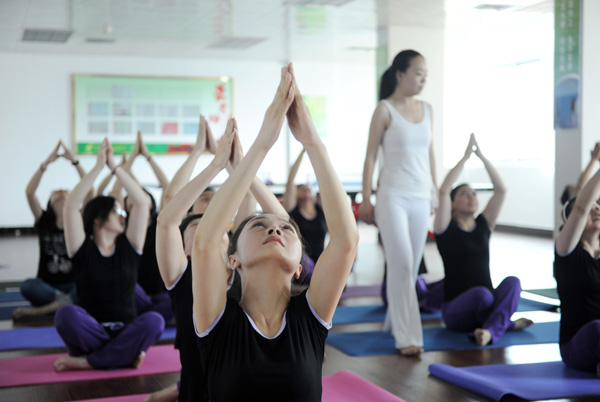

Female employees from the Postal Savings Bank in Dongyang, Zhejiang province learn yoga during their break time. Professional women spend most of their time sitting at a desk, which puts them at risk of health problems. (Photo: China Daily/Bao Kangxuan and Chen Chaobin)
Experts say hours spent at a desk while juggling the pressures of office and family life are leading to disease, stress and even cancer for the new generation of professional women in China. But perhaps a little exercise three times a week could help.
China's workforce has changed rapidly over the past few decades, with the number of women who go out to work steadily rising.
Since many women continue in paid employment while juggling their responsibilities as mothers and carers, researchers are finding that work-related health problems are posing a severe threat to the professional female.
"Increasingly, females are facing various occupational diseases, some chronic and some acute," said Zhou Qinlu, a mass fitness researcher at the Beijing Institute of Sports Science, who has been focusing on female health for years.
"Most professional women, who are generally 20 to 60 years old, are troubled by health problems, including high blood pressure, high blood sugars and coronary heart disease resulting from excessive body fat," said Zhou.
Zhou said some are also struggling with menstrual disorders, a difficult menopause, sleeping disorders and even cancers due to their overworked immune systems.
In addition, almost every working woman experiences some sort of spinal problems, including pain in the back, leg, neck area or arms, while some report numbness in the arms and hands.
"It is suggested that professional women should exercise regularly, at least three times a week for no less than 30 minutes each time, consisting of both aerobic workouts and strength training," said Zhou.
According to Zhou, a study by the Women's Federation five years ago suggested that only 28.8 percent of the public consistently exercise regularly.
However, employed women get evenless exercise, with only around 6 percent training regularly.
Many professional women spend most of their time sitting at a desk, which results in a sedentary lifestyle known to put them at risk of conditions including high blood pressure, anxiety, depression, certain cancers, weight gain and obesity.
"Occupational sitting increases the risk of certain conditions in women, and poor posture or a poorly designed workstation can lead to curvature of the spine," said Zhou.
"We are also witnessing cases of the pelvis becoming deformed and poor blood circulation, which directly affects fertility."
Zhou suggested that women stand up and stretch after 40 minutes of sitting at a desk, and they should encourage companies to introduce standing-up desks in offices.
"The sad thing is, recent research suggests the proportion of people leading a healthier lifestyle is barely increasing. It is still below 10 percent," she said.
"Most women, especially those in the workforce, find that work puts too much pressure on them yet deprives them of enough time for regular exercise," said Zhou.
"They spend their time in the office, or on the way to and from the office, and when they get back home they are too exhausted to do squats or core training."
Zhou has been giving advice on daily exercise and regular workouts throughout the country in the past few years, in her role as a counselor of the Women's Federation, to better promote women's health in the country.
Zhou said her research over the past few years suggests that people from first-tier cities, including Beijing, Shanghai and Guangzhou, report even less time scheduled for workouts compared with those from less-Hangzhou.
"Professional women should take this as a warning, and not sacrifice their health too much for work," she said.
In addition to raising awareness, companies should come up with a more "workout friendly" office environment to encourage more of their female employees to take up exercise.
"We have been promoting office yoga for a long time, which does not require too much space or too many facilities," said Zhou.
"Exercise involving stretching would help female staff members to better manage their time during work, making them more efficient."
Zhang Qing, founder of sports marketing agency Key-Solution, said proper exercise could reduce some of the hazards of the workplace, by boosting people's immune systems and enhancing their physique.
"Regular jogging and workouts can also help relieve people of possible depression, anxiety and stress disorders caused by the workplace," he said.
Juggling work and family puts additional stress on women, most of who mare still mainly responsible for taking care of the young and old in China's households.
When family and work collide, professional women report mental stress, lack of sleep, fatigue and a higher chance of susceptibility to infection, said Zhou.
According to the 2013 cancer report by the National Central Cancer Registry under the National Health and Family Planning Commission, about 600,000 people suffer from cancer in China every year.
Lung cancer is the most common cancer diagnosed among Chinese men and the leading cause of cancer deaths in China. Among women, breast cancer is the most common and one of the deadliest, the report said.
Chinese pop singer Yao Beina died from breast cancer on January 16 at the age of 33, which has caused intense public concern about the disease.
In addition to giving up smoking and undergoing annual medical checkups, Zhou said regular workouts, which help boost the immune system, also help to protect women againstmany diseases.
Doctors offer hard facts on sexual health
2015-02-12Shanghai‘s health care plan for elderly ‘long overdue‘
2015-01-27China‘s health food market: hard to open the door
2014-11-19New report warns about health costs of westernized diets
2014-11-13Copyright ©1999-2018
Chinanews.com. All rights reserved.
Reproduction in whole or in part without permission is prohibited.